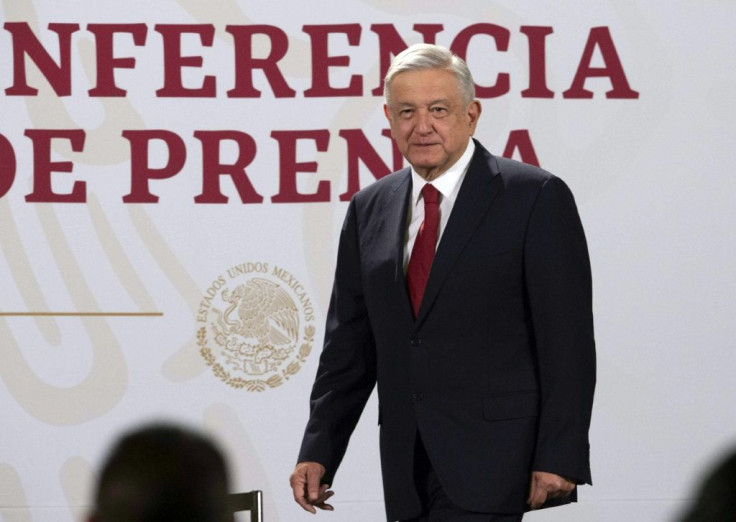Mexico’s President Meets With Trump As His Economy Reels From Covid-19, Oil Price Crash

KEY POINTS
- This marks Obrador’s first foreign visit since assuming power in late 2018
- Obrador has been very accomodating on immigration issues with Trump
- Canadian Prime Minister Justin Trudeau declined to join Trump at the parley
Mexican President Andres Manuel Lopez Obrador will meet with U.S. President Donald Trump in Washington on Wednesday, ostensibly to celebrate the effectiveness of the U.S.-Mexico-Canada Agreement, the trade deal that replaced the North American Free Trade Agreement on July 1.
However, the summit will have one glaring omission -- Canadian Prime Minister Justin Trudeau declined to join Trump at the parley, thereby placing more focus on Obrador.
Obrador had hoped for Trudeau’s attendance, but last week the Canadian Prime Minister expressed concerns about possible U.S. tariffs on Canadian steel and aluminum. Trudeau also cited that travelling was not appropriate during a pandemic.
"We're also concerned about the health situation and the coronavirus reality that is still hitting all three of our countries," Trudeau added.
“We wish the United States and Mexico well at Wednesday’s meeting,” Trudeau’s office said in a statement.
Without Canada at the meeting, the summit will likely focus on U.S.-Mexico issues.
Colm Quinn of ForeignPolicy.com noted that while Trump has not gotten Mexico to pay for his proposed border wall, he has “convinced his neighbor to stem the number of asylum seekers crossing the southern border. The number of individuals making the journey has decreased significantly in 2020, in part due to a policy of holding U.S.-bound asylum seekers in Mexico while their claims are being processed.”
Obrador will also likely seek help for a Mexican economy that has been hammered by the covid-19 pandemic. Mexico now has the ninth highest number of coronavirus cases in the world and has recorded the fifth highest number of deaths.
The International Monetary Fund predicted that Mexico’s economy will shrink by 10.5% this year – as the country is facing its deepest recession in nearly a century.
Mexico remains the U.S.’s top trade partner, with bilateral trade volumes exceeding $600 billion annually.
“This is about the economy, it’s about jobs, it’s about well-being,” Obrador said prior to his flight for Washington. “It is a very beneficial meeting; it will be very important to encourage economic integration.”
Obrador has been criticized in Mexico for visiting with Trump so close to the U.S. election. Trump remains a highly controversial figure in Mexico for his comments on immigration and aspirations to construct a border wall. In addition, Obrador has no plans to meet with U.S. Democrats.
“At the very best, it’s careless; at worst it’s putting a finger on the scale of preference in the U.S. election, and that makes no sense,” said Roberta Jacobson, a former U.S. ambassador to Mexico and now an adviser to Joe Biden’s presidential campaign.
Obrador addressed the controversy of his meeting with Trump. He told reporters in Mexico City: “Our adversaries say, ‘How can I go if Mexicans have been insulted?’ I can say to the people of my country that since we have been in office, there has been a relationship of respect, not only toward the government, but especially toward the people of Mexico.”
On Wednesday evening, Trump and Obrador will have a state dinner attended by prominent business leaders, including Mexican billionaires Carlos Slim Helu and Ricardo Salinas Pliego.
Meanwhile, some Democrats think Trump is using this visit to appeal to Hispanic voters in the U.S., as his poll numbers drop.
“For both presidents, this serves as a distraction from the crisis in their countries, which is COVID-19,” said Fernando Cutz, a former member of Trump’s National Security Council in charge of Latin America. “They’d be very happy to be able to shift the conversation to anything else as quickly as possible. Neither has been perceived as doing a particularly good job” in fighting the pandemic.
“Trump can tout one of his few foreign policy achievements and claim that by renegotiating NAFTA, the U.S. ended up with a better deal,” said Michael Shifter, president of the Washington-based Inter-American Dialogue. “He can also appear with a Mexican president, whose people and migrants Trump has relentlessly insulted but who has nonetheless been notably accommodating to the U.S. president on a range of issues.”
Meanwhile, Mexico’s economy is on the ropes.
The country’s Indicador Global de la Actividad Económica, or IGAE, economic indicator, a proxy for gross domestic product, plunged by 19.9% in April – nearly double the previous record drop of 11% during the depths of the financial crisis in 2009.
Mexico, Latin America’s second largest economy, has been badly hurt by the covid-19 lockdown and the crash in oil prices.
“It is not only the result of COVID-19 and the lockdown, but the lack of vigorous policies to help the economy,” said Carlos Capistran, an economist at Bank of America in New York. “The latter and a virus that is still on the loose in Mexico will continue to keep economic activity in contraction territory for many more months.”
Mexico also reported a $3.5 billion trade deficit in May -- exports plummeted 57% and imports tumbled 47% from a year earlier. Automotive exports alone plunged 90%.
“On the import side, it was mostly a sharper decline in imports of intermediate goods that explained most of the sharper contraction,” said Felipe Hernandez, a Latin America economist at Bloomberg Economics. “The result is consistent with weaker manufacturing activity in Mexico.”
© Copyright IBTimes 2025. All rights reserved.





















